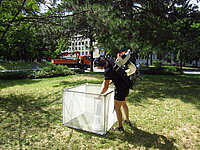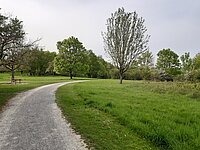UrbanPArt
Phenology of ARThropod communities in URBAN green spaces: The influence of management and landscape factors


Description
The project "UrbanPArt" investigates the importance of urban green spaces for biodiversity, focusing on arthropods (insects and spiders). The aim of the project is to analyze the phenology of urban arthropod communities and to understand how they are influenced by the management of these areas. Additionally, the project examines the role of semi-natural areas in urban fringes and the connectivity between green spaces for arthropods.
To address these research questions, approximately 40 green spaces in the city of Würzburg, with varying management intensities, will be studied over the course of a year. Arthropods will primarily be collected using a suction sampler. In addition, surveys of overwintering insects and spiders in various habitat elements will be conducted. Complementary to this, vegetation surveys and measurements of vegetation structure parameters will be carried out.
The study sites include large, semi-natural sites at the edges of urban development as well as intensively and extensively managed urban green spaces:
- Semi-natural sites: These sites are managed extensively, for example, through staggered mowing (maximum twice per year) or grazing. They are characterized by a high diversity of plant species and a high level of habitat heterogeneity.
- Extensively managed urban green spaces: These areas are mown a maximum of two times per year.
- Intensively managed urban green spaces: These areas are mown at least three times a year or more frequently, depending on the usage. Many of these green spaces are used for recreational purposes.
The urban green spaces also differ in their distance from the city center, ranging from areas located directly in the inner city to those situated in Würzburg's outer districts.
To improve biodiversity-promoting measures in urban areas, existing management techniques and concepts will be evaluated in collaboration with the land managers. Furthermore, the project aims to understand non-political factors (e.g., financial, personnel, or technical considerations) that influence management decisions by practitioners. Especially in urban settings, the multifunctionality of green spaces as their roles in recreation, climate protection, and ecosystem services must also be incorporated into management and maintenance concepts alongside their ecological importance.
By working closely with practitioners, the project ensures that the insights gained can be directly integrated into the design and maintenance of urban spaces. In this way, the project contributes to the promotion of biodiversity in cities.
Duration
since 2024
Project contact:







